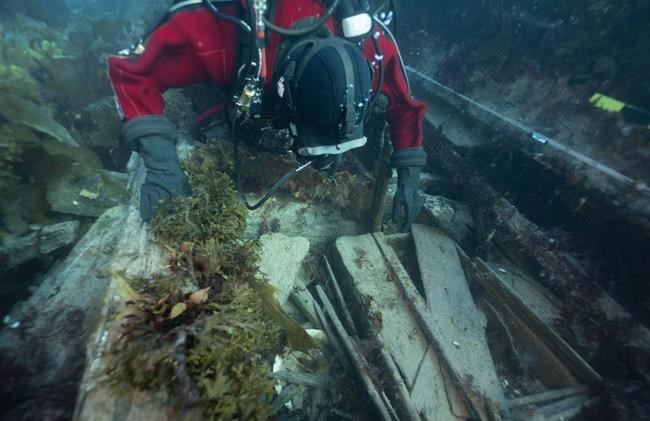Eleven metres below the surface of the Northwest Passage, deep within the wreck of one of Capt. John Franklin's doomed ships, something caught the eye of diver Ryan Harris.
Harris was in the middle of the 2022 field season on the wreck of HMS Erebus. The team had been hauling dozens of artifacts to the surface -- elaborate table settings, a lieutenant's epaulets still in their case, a lens from someone's eyeglasses.
But this, sitting within the steward's pantry, was something else.
"It's probably the most remarkable find of the summer," said Harris, one of the Parks Canada team of archaeologist divers who have been excavating Franklin's two lost ships since they were found under the Arctic seas.
"We came across a folio -- a leather book cover, beautifully embossed -- with pages inside. It actually has the feather quill pen still tucked inside the cover like a journal that you might write in and put on your bedside table before turning in."
Maybe it's just an inventory of stores or someone's laundry list. It was found in the pantry. Or maybe it's more.
"We're quite excited at the tantalizing possibility that this artifact might have written materials inside," Harris said. "It's being analyzed in the lab now."
Erebus and HMS Terror set out from England in 1845. Commander Sir John Franklin and his 129 men never returned.
More than 30 expeditions tried to find them. A few artifacts, graves and ghastly tales of cannibalism is all they uncovered.
But with a blend of Inuit oral history and systematic, high-tech surveys, Erebus was found in 2014, just off the northwest coast of King William Island in Nunavut and Terror two years later. The discoveries made headlines around the world.
Since then, Parks Canada has been working to understand what is down there and what light it could shed on a story that has become part of Canadian lore.
Divers didn't visit Terror in 2022. That vessel, down twice as deep as Erebus, is deemed more secure and the archaeologists wanted excavate the more vulnerable wreck first.
After two seasons lost because of the COVID-19 pandemic, it was a busy summer.
Field seasons in the Arctic are brief. The divers and conservators had just 11 days moored over the site of the wreck with their tender barge and the RV David Thompson, Parks Canada's 29-metre research ship.
But over that time the team squeezed in 56 dives. Each dive lasted about two hours -- possible only because the divers used suits heated by warm water pumped from the surface.
Harris said the ship seems to have been left in good order. Doors and drawers were closed, everything squared away.
A total of 275 artifacts were recovered. The steward's pantry was a main focus of the summer and much of what was recovered from there is tableware -- stoneware plates, platters and serving dishes.
The divers also began excavating the officers' cabins. In the one that would have been occupied by 2nd Lt. Henry Thomas Dundas le Vesconte, whom Franklin charged with map-making, they found a green box that at first looked like a book.
"My partner and I realized that it's not a book at all," Harris said. "It's actually a set of drafting implements -- the professional tools of the trade for a ship's officer. It's quite possible these are the tools used to map their way through the Northwest Passage, which I think is fantastic."
Divers use a vacuum dredge to clear away much of the accumulated sediment.
The work, however, remains slow, painstaking and delicate. The leather folio was excavated bit by bit with a spoon.
On one dive, Harris was handling the dredge when he suddenly stopped.
"I started to see what looked like a piece of paper almost fluttering in the movements of the water. This is very, very delicate."
That paper surfaced in a Ziploc bag and is now being analyzed.
There are years of work to do, Harris said. Divers have only poked their masks into a few square metres of a wreck 36 metres long, nine metres wide and five metres deep.
Much remains in the officers' cabins. The sailors' chests, which held their personal belongings, are still mysterious. Divers haven't even entered the bottom deck. And then there's Terror.
"There's so much material in either of these ships," Harris said.
Retrieving it from the icy deeps is only part of the job. The artifacts have to be conserved, studied and analyzed at Parks Canada's lab in Ottawa, where this summer's haul now sits.
Harris has dived to the wreck many times and acknowledges he gets focused on the task at hand. Nothing, after all, will ever match his first sight of Erebus.
"I couldn't see where the wreck was because the visibility was poor," he recalled. "I had to pick a direction and go, and then I saw the first plank lying on the sea floor.
"I followed it hand over hand until all of a sudden, out of the gloom, there it looms. It's towering overtop of you, the shadow of this enormous bulk of shipwreck lying proud on the sea floor."
But the thrill never entirely fades.
"You're taken with this feeling that you're in this hallowed space. Not just in view of the history, but because here's where human beings were confronted with their own mortality. It's a remarkable thing to experience."
This report by The Canadian Press was first published Dec. 18, 2022.
-- Follow Bob Weber on Twitter at @row1960
Bob Weber, The Canadian Press



